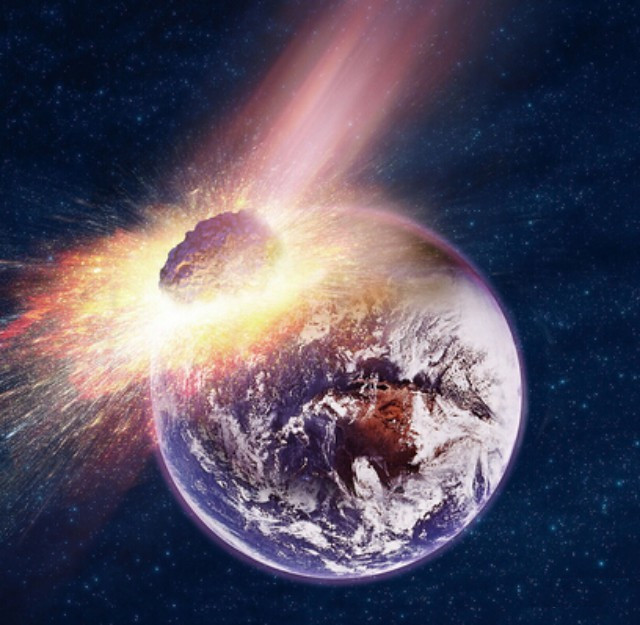NASA: Earth is not prevented from being impacted by meteorites
The ability of our Earth to be hit by planets is extremely rare, but it is actually only a matter of time before this disaster comes true.
Experts warn that people do not have any defenses for meteorite fiction rushing to Earth. And when it happens, we can hardly do anything to cope.
A NASA scientist said, human's greatest hope is only based on a shielded missile stored in the warehouse, to deflect meteors when it intends to hit our planet.
In a meeting earlier this week, NASA's Dr Joseph Nuth said: "The biggest problem for mankind is that when the Earth is in danger we can't do much. Meteorites and comets are events. causing a high degree of extinction, they have caused death to all dinosaurs, of course, you can say, those large-scale "purges" of the universe have just happened. , but there are random situations that we do not anticipate. "
In the past, a comet has advanced very close to Earth. In 1996, it was fortunate that it "responded" to Jupiter instead of selecting Earth as the destination, although the distance of the impact was extremely small.
According to Dr. Nuth, comets are usually only discovered when it is too late, there is not enough time for us to keep deflecting.
Dr Nuth said: "If you look at the schedule to launch a reliable and high quality spacecraft to protect the Earth, it will take you 5 years to do it. While we only have a total of 22 months, after the warning about the threat is made.

The danger comes from meteorites that are very unpredictable.(Photo: Getty Images).
Dr. Nuth advised NASA to build a blocking missile , along the spacecraft's observatory. This will reduce the time it takes to prepare the launch of the spacecraft, which is only 2.5 years compared to 5 years ago. And if a rocket is designed to be launched within a year, it can mitigate the impact of small planets, coming from places that are difficult to observe like the sun.
This is not the first time experts have warned about the neglect of the Earth in the danger of being struck by meteorites. In September 2012, Director of the Office of Science and Technology Policy, John Holdren said: "If there is a collision, the Earth will suffer a lot."
He pointed out two shocking events that have just happened recently that shocked the world. It was a meteorite explosion in the sky of Russia's Chelyabinsk region in 2013 and the Tunguska fireball in 1908. Although scientists have been working hard to detect strange objects at risk of crashing into the Left. land, Mr. Holdren still thinks we have too much to do.
"Although there is not enough preparation yet, we are in the process of trying to prevent more things. If we think we are capable of modernizing technology, we should prepare carefully for the events. Because once they happen, the Earth can be destroyed and the human race will be annihilated, 65 million years ago, this threat erased the dinosaurs, and we have to be smart. more than them, " Mr. Holdren said.

ARM is the key program to deal with meteorites hitting Earth.(Photo: NASA).
Holdren added that NASA's Mission to Turn Small Planets (Asteroid Redirect Mission) program could provide the education needed to cope with these dangers.
The cost of the program is estimated at $ 1.1 trillion (excluding rocket launch and flying costs in December 2021). In the planned project, the robot will push a giant rock into the meteorite and wrap it around the moon. This will become a place to prepare for the future of humans on Mars.
According to the main summaries of the program, NASA agreed to allow ARM to take the next step in designing and developing parts of the robot. ARM is two important projects that will integrate robots into the crew to operate space ships.
"This is a special milestone for ARM. ARM not only takes advantage of the tremendous capabilities of forces, but also examines many new technologies in the development process," said NASA representative.
Before starting the journey into the moon's orbit, the ARM spacecraft will emulate the meteorite deflection technology called a gravity tractor.
- 5 NASA steps dealing with meteorites crash into Earth
- The surface of the 'giant' meteorite landed on Earth
- Huge meteorites will graze the Earth
- NASA established an Earth defense unit against the risk of collisions with meteors
- Two meteorites fly close to the earth today
- Spacecraft blocking meteorites rushing towards the earth
- Video simulating the meteorite scene hit the globe
- The explosion caused meteorites to pass through the sky in the United States, suspected of causing earthquakes
- NASA: Deflect meteorites with nuclear weapons
- Meteors are hard to destroy the earth
- NASA launched the mission to hunt meteorites in 2019
- NASA expert revealed
 Van Allen's belt and evidence that the Apollo 11 mission to the Moon was myth
Van Allen's belt and evidence that the Apollo 11 mission to the Moon was myth The levels of civilization in the universe (Kardashev scale)
The levels of civilization in the universe (Kardashev scale) Today Mars, the sun and the Earth are aligned
Today Mars, the sun and the Earth are aligned The Amazon owner announced a secret plan to build a space base for thousands of people
The Amazon owner announced a secret plan to build a space base for thousands of people